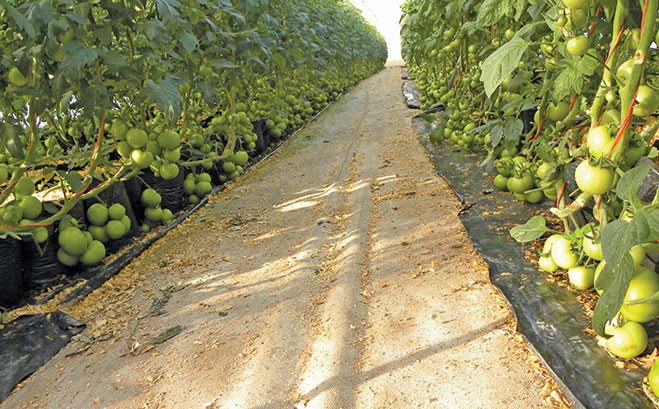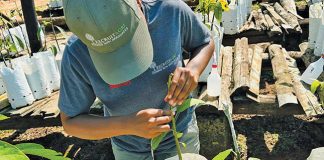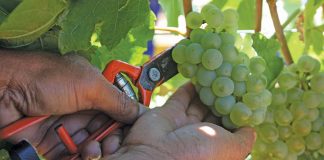
Photo: FW Archive
Why did you choose to set up a business in Africa, and why in agriculture?
I had spent about 25 years working primarily out of New York, and during this time I had the opportunity to work around the world with Global 1000 clients [the world’s top 1 000 companies by market value]. However, I never really worked in Africa.
Then about 10 years ago, I had a chance to come to Africa and I toured around a good portion of the Southern African Development Community [SADC].
I spent a lot of time in safari camps and spoke a lot to the staff in these camps, and I was fascinated to learn about the working arrangements of some of these people, working away from their homes and families for up to three months at a time, leaving their children either with their wives or with grandparents, in order to earn a living for the family.
After that trip, I became involved in a lot of non-profit work, especially in Botswana, doing a lot of advocacy work around early childhood education programmes. However, one of the challenges I kept encountering was the impact of the high levels of youth unemployment, which, in Botswana according to official statistics, is close to 40%.
As a result of this, all the work done to ensure children could access better education ended up having very little impact on improving their lives, as they eventually went back into an environment where there was no employment, and a multitude of associated social problems.
At the time, I was constantly writing business plans for little cottage industries that could be established in a country like Botswana, which could provide employment, specifically for women and the youth.
I had also reached a point in my career in New York where I was really reflecting on whether I needed to continue on my current career path, or make a change.
I decided it was time for a change, and jumped in with both feet. With the ambition to start businesses in Botswana that would be scalable across the SADC region, I relocated to Botswana and allocated a part of my savings as start-up capital to establish Accite.
This was six years ago.
The investment premise around Accite is to build a business or businesses that would create economic diversification.
Given that Botswana’s economy is primarily based on mining and minerals trading, I set out to create new economic opportunities using proven technology as a catalyst for business development.
The business also had to create employment for the youth and women, and it ideally had to make a positive, sustainable impact on the community. It turned out that agriculture checked all these boxes.
How did you go about establishing Accite?
I looked at a variety of opportunities, not only in agriculture, and invested in a number of them.
In terms of using technology as a catalyst for the business, I found that it is very important to understand how best to apply technology in the local business context.
One of the mistakes investors make is to take a business model or technology that works in Europe or in the US, and use that exact same business model and technology in Africa, thinking that it will work just the same.
However, you really need to take a step back and see how the technology will fit into the local context, and make sure that not only the technology solution, but also the whole operating model around that solution, has been localised to really reflect the local culture, labour market and other aspects.
The farming business that I started is called Go Fresh! Botswana. We make use of hydroponic technology to organically grow vegetables such as leafy greens, herbs, cucumbers, tomatoes and peppers in two 2 100m² climate-controlled greenhouses.
Central to the business is the principle of distributed growing, which means that we grow the produce as close as possible [no more than 50km away] to where it will be consumed.
One of the greenhouses is located just outside of Gabarone, and the produce is sold to restaurants, supermarkets and wholesalers in the city.
The second greenhouse is in Maun, about 1 000km north of Gabarone, in the heart of Botswana’s main tourism area, and this produce is supplied directly to the local safari and hospitality industries, as well as supermarkets in the area.
By positioning the greenhouses so close to the point of consumption, we have eliminated most of the cost and spoilage associated with transportation.
In terms of productivity, we have benchmarked ourselves against average production yields in Botswana, and compared with these, we grow between four and 40 times more food per square metre.
We are about three years into production now, and currently have a market share of about 5% in Botswana for the crop categories that we grow. During the next expansion phase, I believe we can scale that up to 35%, and in so doing, create about 340 jobs.
How did you structure your business to ensure that it would create employment, specifically for young people?
I hired new college graduates to fill management and leadership positions. While some may question the wisdom of this, I found that by hiring the young graduates before they learned poor business management skills somewhere else, I was able to train them from scratch and give them the opportunity to take on a tremendous amount of leadership responsibly from the start.
I also employ two or three people for a position that would, in a similar business in the US for example, probably have only employed one person; this is not only to create more job opportunities, but also to provide backup in case of attrition, and to ensure that I already have a pool of skilled staff available when we start scaling up the business.
With the graduates that I employ, I have found that while they enter the job market equipped with good technical skills, they often lack soft skills such as creative problem solving, effective communication and customer service, so the business has to invest a lot in helping staff develop these skills.
Given the challenges that investors are likely to face when becoming involved in developing agriculture in Africa, what are the most appropriate technologies in which to invest?
If you want to invest in technology as a catalyst to develop agriculture in Africa, I think the first step is to be cognisant of the challenges you will face. People are situated long distances away from each other and many of them are, for the most part, still completely off the grid.
Thus, I believe one of the best models for developing farming in Africa is effective out-grower programmes for smallholder farmers, which formally tie these farmers in with commercial operations.
Keep in mind that many smallholder farmers do not have much education, and using intricate technology that will require them to read and do maths may not be appropriate.
This is why any investment in developing agriculture on the continent should include a definite focus on education, whether it be at basic school level or at higher education level.
However, to benefit those smallholder farmers who lack education, we have to look at solutions that will offer them an incremental increase in income, like out-grower programmes.
If you can double the income that a family receives from farming, that family can double their expenditure on food and school fees, for example.
These incremental changes, while seemingly not significant in terms of monetary value, can make a significant impact on a family’s quality of life.
So, do you believe that education has a significant role to play in agricultural development in Africa, as well as in the uptake of new technology in the sector?
There needs to be an emphasis on education, because a lack of education does not only impede access to technology, but it also impedes productivity.
If you can’t read a product label, you can’t use that product efficiently and effectively. If we want to move people out of poverty by moving them into an out-grower programme, for example, that farmer needs to be able to read simple instructions.
Email Michelle Adelman at [email protected], or visit acciteholdings.com or gofresh.farm.











